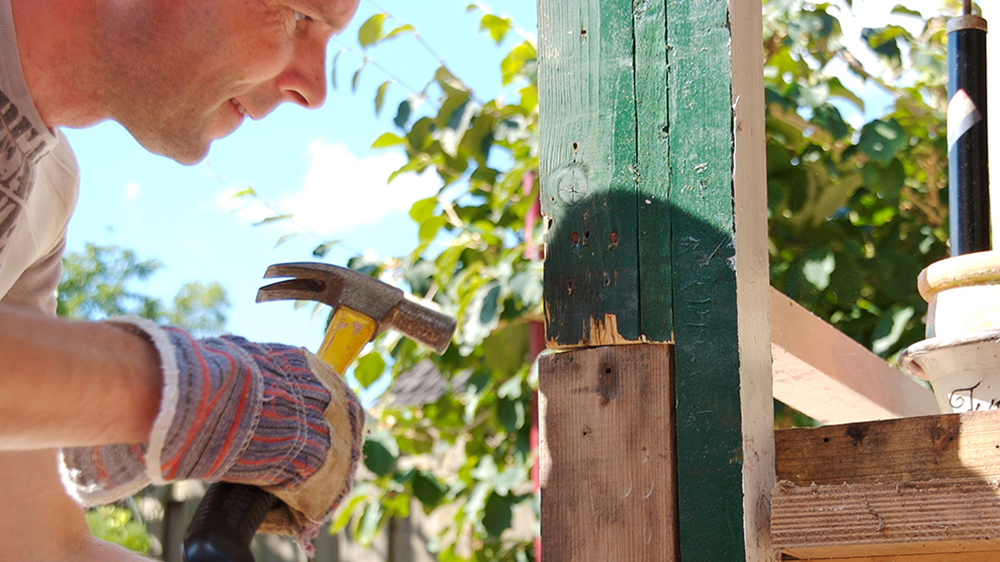
Your insurance company won’t be on your side if something goes awry with your renovation and you don’t have a permit.
“Eh, we’ll just knock it out this weekend, not going to worry about the permit”… not so fast there partner. No shooting from the hip here! You can not only get into trouble with your insurance company and the local building department, but when it comes time for you to sell? You better have that permit in hand for these DYI improvements.
You might roll your eyes at having to get a permit before doing a DIY project around the house, but permits serve a purpose.
Permit requirements are just ways for the city to nickel-and-dime you to death, right? Is your city invading your privacy by caring whether you want to replace your overhead light fixture with a ceiling fan?
Before you get too worked up, realize that cities have their reasons for requiring permits. “Obtaining a permit means that someone knowledgeable will review your plans and help spot mistakes before you begin the work,” says Rick Goldstein, an architect and co-owner of MOSAIC Group in Atlanta, GA. If you make improvements without a permit, you might receive a big, fat denial letter from your insurance company when something goes wrong and you want to cash in.
You know the phrase “You don’t know what you don’t know”? Well, that’s the way it is with permits. That ceiling fan might be too heavy to hang from a box designed for a simple light fixture, especially when it’s going full blast and vibrating. You don’t want the fan falling on you while you sleep!
You might know some projects that require a permit, but you might be surprised by these eight DIY projects that typically require a permit too.
-
Installing a gas stove
Many people are making the switch from an electric to a gas stove. Depending on where you live, gas could be much cheaper, and if you’re a foodie, food just tastes better cooked over fire. But if installed incorrectly and the gas leaks, it could be extremely harmful. Get a permit and make sure someone is checking behind you to catch any mistakes.
-
Replacing windows or doors
If you think this project seems pretty straightforward, think again. For windows, you need a permit to ensure emergency egress requirements are met in case first responders need to get in. If windows and doors aren’t properly installed, water could get into the house. No one wants a side of mold with their renovations.
-
Building a deck
When dreams of outdoor living beckon, first call the permit office. If your deck isn’t structurally sound, or if you used untreated lumber that decays, your deck could collapse, and that could really interfere with your meditation mantra. And don’t even try to guess how to meet building codes for railings. Be safe and get that permit.
-
Putting up a fence
“Building a fence requires a survey and a permit,” Goldstein says. The reason for this is usually to ensure you aren’t violating city ordinances by building a fence too high in your residential subdivision or choosing one with barbed wire in the middle of the city. If you build a fence without a permit, you might receive a stop-work order.
-
Installing a storm shelter or safe room
If you want protection from tornadoes (and hurricanes), you might consider installing a shelter. But unless you design and construct this room to FEMA specs, you might not be so safe after all. A huge benefit of a prebuilding permit is that you can register it. “If there is a tornado in your area, first responders will know who has storm shelters and where they need to look for you in case you get trapped inside,” says Blake Lee of F5 Storm Shelters in Tulsa, OK.
-
Remodeling a kitchen or bathroom
Picking out the perfect granite for your countertops and finding just the right fixtures and cabinetry aren’t the only things on your checklist. If you neglect to get a permit for major remodeling work, you might not be able to easily sell your home in the future.
“If an inspector catches this kind of thing, or if a bank wants to make sure it’s covered against all liability and demands to see the permit before funding a mortgage, this can potentially be a major time and money sink to rectify,” says Kimberly Wingfield, a Philadelphia, PA, real estate agent and DIY fanatic.
-
Installing new electrical wiring
Your house in the historic district simply isn’t wired for all your gadgets — but an amateur electrical wiring job could cause a fire. This project definitely needs a permit.
-
Replacing a gas water heater
Surely you can replace your old water heater without a permit, right? Nope. Although many DIY enthusiasts do it all the time, if it’s done wrong, a fire or flood could ensue, or if gas escapes …kaboom. These risks leave a huge potential for serious injury. A permit also means that an inspector looks over your completed job to ensure it was done properly. This is a huge confidence boost in the knowledge that your work is up to code — and minimizes the potential for home-sale complications down the road.
Source: Trullia Blog

 Facebook
Facebook
 X
X
 Pinterest
Pinterest
 Copy Link
Copy Link







